¿Alguna vez has intentado abrir una de tus entradas de WordPress y te ha aparecido un error 404? A veces nos ocurre cuando trabajamos en nuestros propios sitios de WordPress o ayudamos a nuestros usuarios.
Este error se produce cuando puede acceder al área de administración de WordPress y al blog, pero cuando intenta abrir una entrada concreta, aparece el mensaje “404 no encontrado”.
Puede ser frustrante ver que tu contenido desaparece, pero hemos encontrado algunas soluciones para solucionar este problema. En esta guía completa, le mostraremos cómo arreglar las entradas de WordPress que devuelven errores 404.
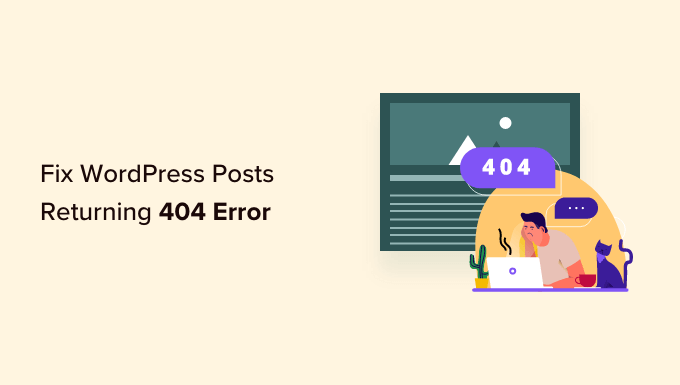
¿Por qué mis entradas de WordPress devuelven un error 404?
Hay varias razones por las que sus entradas pueden mostrar un error 404 “Página no encontrada” en WordPress. Estos pueden incluir:
- Conflictos de plugins o temas: A veces, los plugins o temas que has instalado en tu sitio pueden interferir con la forma en que WordPress gestiona los permalinks. Esto puede provocar enlaces rotos y errores 404.
- Problemas de código personalizado: Si has añadido código personalizado a tu sitio web, puede haber errores en el código que estén afectando a los permalinks o causando otros conflictos, dando lugar a errores 404 para tus entradas.
- Problemas con su archivo .htaccess: El archivo .htaccess juega un papel importante en cómo WordPress estructura las URLs. Si este archivo está dañado o no existe, puede provocar errores 404 en tus entradas o páginas.
Cómo encontrar todas las entradas de WordPress con errores 404
Antes de llegar a las soluciones, sería bueno averiguar si este error sólo está ocurriendo en uno o dos puestos o en varios. De esta forma, podrás determinar el alcance del problema y elegir la solución más adecuada.
Una forma sencilla de averiguarlo es utilizar Google Search Console. Si aún no has enviado tu sitio a Google Search Console, lee nuestra guía sobre cómo añadir tu sitio WordPress a Google Search Console.
Una vez que el robot de Google haya rastreado e indexado su sitio, Google Search Console le proporcionará información detallada sobre el rendimiento de su sitio, incluidos los errores 404 que encuentre.
Para saber qué entradas están devolviendo errores 404, puedes acceder al panel de control de Search Console. A continuación, ve al informe “Páginas” y verás una lista detallada de todos los errores.
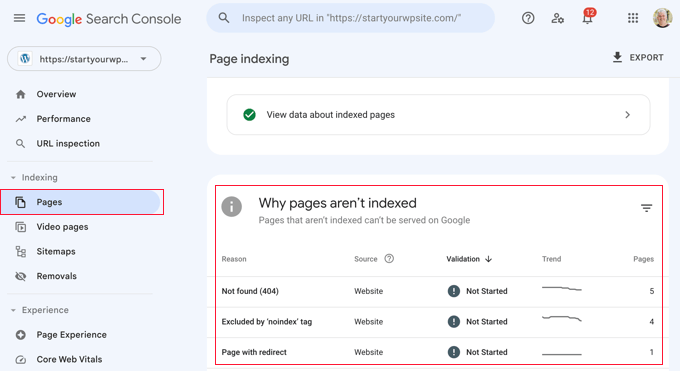
Para obtener más información, puede leer nuestra lista de consejos para utilizar Google Search Console con el fin de aumentar el tráfico del sitio web, que incluye algunos consejos sobre cómo solucionar errores 404 con la herramienta.
Dicho esto, veamos cómo corregir las entradas de WordPress que devuelven errores 404. Puede utilizar los siguientes enlaces para ir directamente a las diferentes soluciones:
¿No tiene tiempo para arreglar los errores 404 usted mismo? ¡WPBeginner Pro Services puede ayudarte! Con nuestro asequible Soporte WordPress de Emergencia, puedes contratar expertos para arreglar errores 404, enlaces rotos, problemas de redireccionamiento y mucho más. Deje de estresarse por los problemas de WordPress y ¡arréglelos! ¡Programe un Servicio de Soporte WordPress de Emergencia hoy mismo!
Método 1: Comprobar si hay conflictos de plugins o temas y problemas de código personalizado
A veces, los plugins, temas o código personalizado que has añadido a tu sitio web de WordPress pueden interferir con los enlaces permanentes o causar conflictos, dando lugar a errores 404. Incluso lo hemos experimentado nosotros mismos cuando probamos herramientas en nuestro sitio de demostración.
Una forma de resolver este problema es desactivar temporalmente los plugins. Los plugins a veces pueden alterar la forma en que WordPress gestiona los enlaces.
Una vez que hayas desactivado los plugins, puedes reactivarlos uno a uno mientras compruebas si el error 404 reaparece después de activar cada plugin. Si el error aparece después de activar un plugin específico, ese podría ser el culpable.
A continuación, puedes hacer una búsqueda rápida en Google de soluciones relacionadas con ese plugin o ponerte en contacto con el desarrollador del plugin para obtener asistencia.
Del mismo modo, su tema de WordPress podría estar causando el conflicto.
Para comprobarlo, puedes cambiar temporalmente a un tema predeterminado de WordPress como Twenty Twenty-Three o Twenty Twenty-Four. Solo tienes que ir a Apariencia “ Temas y hacer clic en “Activar” en un tema predeterminado.

Si el error 404 desaparece con el tema predeterminado, indica un posible conflicto con su tema actual. A continuación, puedes intentar solucionar el problema con el tema o considerar la posibilidad de utilizar un tema diferente.
Puede consultar nuestra selección de expertos de los temas de WordPress más populares para obtener recomendaciones.
Si ha insertado recientemente fragmentos de código en su sitio web, es posible que haya errores en el código que causen los errores 404. Examina detenidamente el código que has añadido y comprueba si puedes identificar algún error.
La forma más segura de añadir fragmentos de código a WordPress es con el plugin WPCode. Este plugin te permite insertar código personalizado sin trabajar directamente con los archivos del tema, lo que reduce el riesgo de romper tu sitio web.
Además, siempre que WPCode detecte un error en tu código, desactivará automáticamente el fragmento y te pedirá que lo compruebes. También puedes utilizar el modo de prueba para comprobar si tu código funciona antes de enviarlo a tu sitio web.
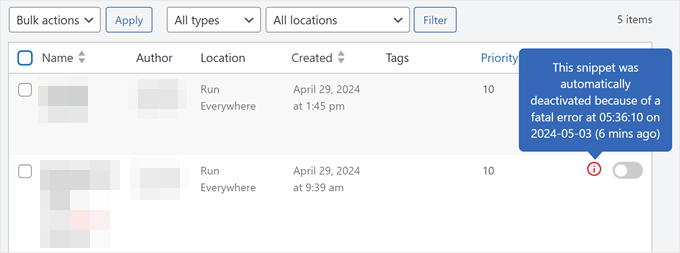
Si ninguna de estas soluciones funciona, pasa al siguiente método en el que solucionaremos los problemas de configuración de tu enlace permanente.
Método 2: Corregir la configuración de Permalink
Las entradas de WordPress pueden devolver errores 404 debido a problemas con las reglas de reescritura en su archivo .htaccess. En la mayoría de los casos, puede corregir el problema actualizando sus ajustes de enlaces permanentes.
Simplemente vaya a Ajustes ” Enlaces permanentes en el administrador de WordPress y haga clic en el botón “Guardar cambios”.
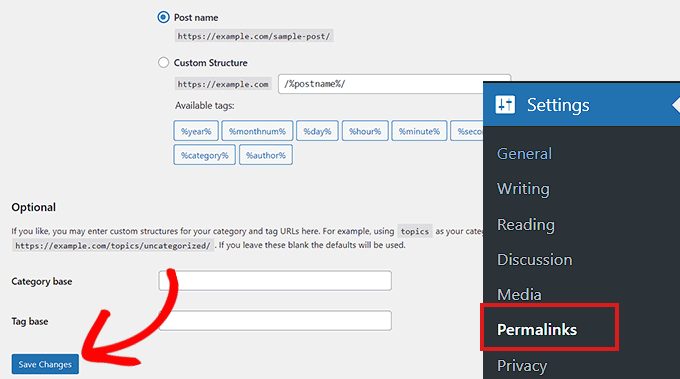
No es necesario realizar cambios en los ajustes de los enlaces permanentes. Esto actualizará los ajustes de enlaces permanentes y eliminará las reglas de reescritura.
En la mayoría de los casos, esta solución corrige el error 404 de las entradas de WordPress. Sin embargo, si no le funciona, probablemente necesite actualizar su archivo .htaccess manualmente.
Método 3: Actualizar el archivo .htaccess de WordPress
Antes de empezar, asegúrese de hacer una copia de seguridad de su archivo .htaccess de WordPress. Si algo va mal, puede restaurar fácilmente el archivo original.
Ahora, tendrá que conectarse a su servidor utilizando un cliente FTP como FileZilla o la aplicación Administrador de Archivos en el escritorio de alojamiento de WordPress.
A continuación, tendrá que encontrar y editar el archivo .htaccess, que se encuentra en la misma ubicación que carpetas como /wp-content/ y /wp-includes/.
Basta con hacer clic con el botón derecho en el archivo y seleccionar “Permisos de archivo”.
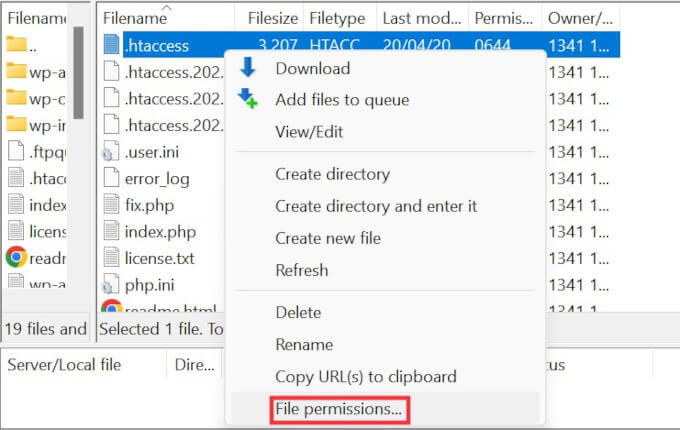
Puede hacer que el archivo sea de escritura cambiando sus permisos a 666.
Basta con introducir “666” en la casilla “Valor numérico” y hacer clic en “Aceptar”.
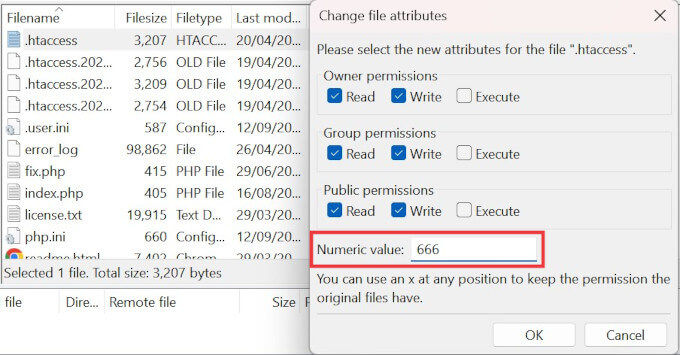
A continuación, debe repetir los pasos del primer método de nuestro tutorial. Una vez hecho esto, no te olvides de cambiar los permisos de nuevo a 660.
También puede editar el archivo y añadirle código.
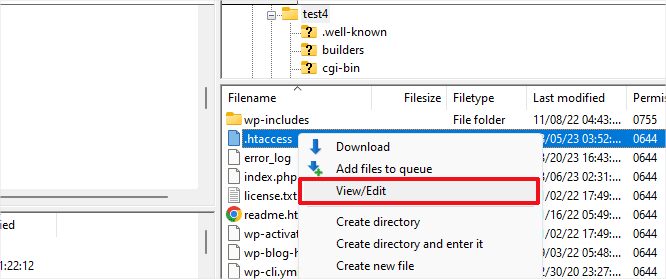
Una vez que haya abierto el archivo .htaccess con un editor de texto, simplemente inserte este código:
1 2 3 4 5 6 7 8 9 10 | # BEGIN WordPress<IfModule mod_rewrite.c>RewriteEngine OnRewriteBase /RewriteRule ^index\.php$ - [L]RewriteCond %{REQUEST_FILENAME} !-fRewriteCond %{REQUEST_FILENAME} !-dRewriteRule . /index.php [L]</IfModule># END WordPress |
Método 4: Póngase en contacto con su proveedor de alojamiento
Si ninguna de las soluciones anteriores ha corregido el error 404 de las entradas de WordPress, le recomendamos que se ponga en contacto con su proveedor de alojamiento de WordPress. Es posible que haya un error por su parte o que puedan ayudarte a diagnosticar el problema.
Consulte también nuestra guía sobre cómo solicitar soporte de WordPress correctamente y obtenerlo.
Método 5: Activar mod-rewrite (Instalación local de WordPress)
Si está utilizando un servidor local para realizar pruebas, deberá activar mod_rewrite en la configuración de Apache de su sitio MAMP, WAMP o XAMPP.
Esto permitirá a WordPress generar URLs limpias y evitar el error 404 para entradas y páginas en su servidor local.
La forma de hacerlo dependerá de la plataforma que utilices. Las personas que utilizan XAMPP pueden abrir su panel de control y hacer clic en el botón ‘Config’ dentro de Acciones. Luego, selecciona ‘Apache (httpd.conf)’.
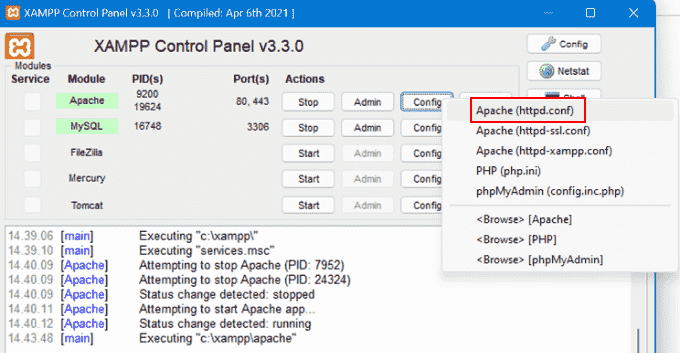
A continuación, tendrá que encontrar esta línea #LoadModule rewrite_module modules/mod_rewrite.so y quitar el ‘#’ para descomentarla.
Esto cargará el mod_rewrite.
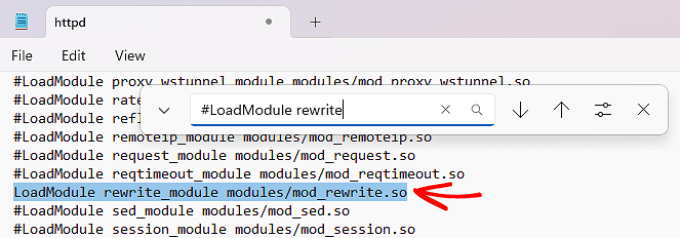
A continuación, busque todas las instancias de AllowOverride None y cámbielas a AllowOverride All.
El valor “Todas” significa que se pueden anular todas las directivas.
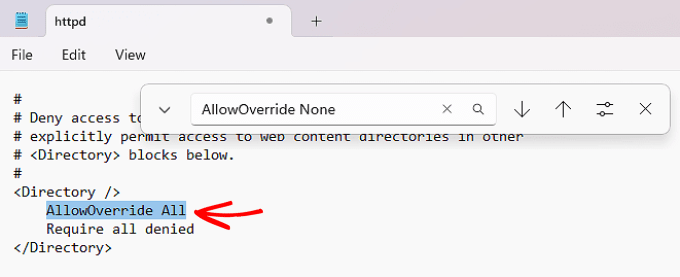
Una vez hecho esto, puedes guardar el archivo httpd.conf y cerrarlo. Después, en el panel de control de XAMPP, haz clic en ‘Detener’ en el módulo Apache y en ‘Iniciar’ de nuevo para reiniciarlo.
A continuación, vuelva a su panel de administrador para ver si sus enlaces permanentes están trabajando.
Tutorial en vídeo
Si necesita instrucciones visuales, no tiene más que ver el siguiente vídeo.
Esperamos que este artículo te haya ayudado a resolver los errores 404 en las entradas de WordPress. Es posible que también desee ver nuestra guía de los errores más comunes de WordPress y cómo solucionarlos, junto con nuestras selecciones de expertos para los mejores plugins de WordPress para hacer crecer su sitio.
If you liked this article, then please subscribe to our YouTube Channel for WordPress video tutorials. You can also find us on Twitter and Facebook.




Robert
Well, your tip saved me hours of searching – many thanks
Nima Arefi
Thank’s you saved my life :d
Juan
Hello, I have a problem since I migrate the website from localhost to a server, the main page looks good but the menu is not displayed but the links do not work always throws error 404.
They can help me, this is a cause of a migration from a local server.
Marissa
I can’t thank you enough for such a simple tutorial!! Everything else I found made it seem so difficult. I recently switched from http to https and it has been one problem after another..
WPBeginner Support
Hi Marissa,
Glad you found this tutorial helpful. Don’t forget to join us on Twitter for more WordPress tips and tutorials.
Admin
Rick
I didn’t have an .htaccess file so I created one with the info you provided above; then uploaded it and the site works perfectly again. Thanks!
Curtis
Hi I have done all the above and noticed the bit of text to copy and paste was already in there! It still is not working and im stressing out!
Tibi
I’ve done the same thing and nothing changed, the home page still not found
Please contact me if you find a solution
Patrick
Wow. This really saved my bacon. Thank you so much for the tip on simply saving the permalinks page. Incredible advice!
Alexis
hello! i’ve reset permalinks many times to deal with the 404 error. this time when i hit save a file downloaded to my computer: options-permalink.php and the site broke. just got a white screen and each time a file downloaded. finally i got the default permalinks to work but this is not a great solution. does this sound familiar to you? tech support didn’t think it was the .htaccess file but i’m not convinces. moved site from one host to another. any help would be much appreciated.
Mike Birdsall
How do I update settings if I can’t log into the WP admin. I get the 404 error when going to /wp-admin
Kelly
So helpful!! thank you!!!!!!
seun
Hello, please help, i seem not getting solution through this tutorial cos i can’
t access my dashboard, i keep getting this message any site directory i open.
Not Found
The requested URL /index.php was not found on this server.
Additionally, a 404 Not Found error was encountered while trying to use an ErrorDocument to handle the request.
Nukak
if you cannot access your dashboard. your issue is most likely a plugin issue. go to phpAdmin and disable all plugins.
this link might help you https://www.wpbeginner.com/plugins/how-to-deactivate-all-plugins-when-not-able-to-access-wp-admin/
once deactivated and you log back in you can then activiate the plugins that you need. all your initial settings before you got locked out of yur site would still remain in tact. all the best.
Clint
Thank you, just clicking save on my permalink page (which has been customised for years) worked immediately.
Chris Keeble
Perfect!
Clicking Save Changes on Settings > Permalinks works first time.
tamim
Wow! that’s a great solution.
Jason
Hi, I was having the 404 error problem. Homepage works fine, all other links have the 404 error. Tried the method you suggested in wordpress settings permalinks and click save changes but it didn’t work for me.
Saw some post earlier about sync the htaccess file through the webhosting settings page somewhere but don’t really know how to do it. Any advice? Thanks
Mohamad Zidani
Hi
I was using Fv Top Level Cats, when i removed still redirection worked from
example.com/category/tech to
example.com/tech.
i try your solution and it doesn’t work.
Joerg Naussed
the 404 appear right away what happen?
Tamara
That worked!! Thank you
Lijo Jose
Thank you, My problem was solved
Mariana Cervantes
Thank you so much!!!! My problem was fixed with the permalink solution
Michael
If this error is affecting your login page, go to .htaccess and remove:
“deny from all”
“allow from 00.00.00.00”
Matt Kay
Fantastic – I had moved my site from one server to another and started getting worried about 404 errors. The fix worked perfectly – so easy!
Bienvenido
A very simple answer to a hair pulling issue. Thanks a bunch. BTW this issue started after I installed BJ Lazy Loading.
Gail Gardner
Thank you! This did the trick.
Ahmed
Hi, One of my site was hacked. There was few hundreds article inserted. Now those has been removed. Google webmaster console showing those as 404.
How this can affect my site how to fix this?
Thanks
Stephanie
Wow, thank you! This worked perfectly.
Mawuli Tanor
Spot on! On the dot!
First fix worked.
Thanks a lot!
Peter Mazzi
Thanks. pity there’s no rating on this page. *****
David M. Curtis
Thank you for posting this article. I had spent months building a store / blog and today none of my pages or posts were working other than the front home page, all other links were taking me to a 404 error page. I was about to start completely over – re-peat months of work. This article saved my site. Now everything is working again. I can’t thank you enough.
WPBeginner Support
Hi David,
We are glad you found the article helpful Don’t forget to join us on Twitter for more WordPress tips and tutorials.
Don’t forget to join us on Twitter for more WordPress tips and tutorials.
Admin
Robin
Hi there, completely stuck here, not a computer guy at all so it’s all greek to me. my homepage is good but I’ve created another 5 pages such as blog post, services, etc. and every time I try to view the page I’ve just created I get NOT FOUND The requested URL /services/ was not found on this server.” I’ve tried saving changes didn’t make any difference and I have no idea what an FTP is. Any help ? thx
WPBeginner Support
Hey Robin,
Try updating your permalink structure. Simply visit Settings » Permalinks and then click on the save changes button without changing anything.
Admin
Preet Karan
Hi everyone,
i installed yoastseo plugin. i generated the XML site successfully, but when i tested it on google search console it is showing 404 error.
i tried the method listed in article but the problem still persist.
also i need to mention that in the CCpanel there are two files of the same name htaaccess and htaaccess.1 (with the same code written that has been mentioned by article above ); is it normal,
can you help me wth the issue
David
I can’t believe just clicking “Save Changes” worked. Thanks!
jorge
hello there im I would really appreciate help I followed the instructions on saving changes on permalinks not a computer person so do not know how to do the other after is showing me this
Fatal error: Class ‘Epsilon_Editor_Custom_Control’ not found
WPBeginner Support
Hi Jorge,
It looks like a plugin on your website is causing the error. You need to deactivate all plugins installed on your website, and then reactivate them one by one until you find the plugin causing the error. See our guide on how to deactivate all plugins when not able to access wp-admin for detailed instructions.
Admin
yugal joshi
great man..thank you much.. i open my site but its throwing 502 error then 503 error and then lastly 500 error..then i solve the problem of 500 from cpanel threw ur post.
but when i open my post pages its showed 404 error then i googled it and find ur post…thanks…
Bren
In the event this is a new server, or an Apache upgrade you may have to check the following:
Open the httpd.conf ie: /etc/httpd/conf/httpd.conf.
Change the AllowOverride None to AllowOverride All.
Save changes
Restart the Apache server.
Mariyam
Wow, as easy as that, Thank you!
Ashley Adams
Having a little trouble… After I hit save changes on the permalink page, another 404 error popped up.
Katherine
This just saved me hundreds of dollars in help. <3
James V
Quick fix…thanks for the help!
marco
still having problems, not sure what to do, i followed steps above, and get same results. my web host company uses windows 2012 server so no .htaccess file. so many of these help posts refer to .htaccess which windows does not use. they use the web.config file i think, is that correct? please help
marco
I have followed the above steps, but still does not work. I am on windows 2012 R12 server and do not have a .htaccess file, even while in FTP force hidden files to display . are there instructions on how to fix this problem when on windows server
WPBeginner Support
Hey Marco,
First you need to download a backup of your existing web.config file to your computer. After that you need to edit the file on your server and add following rule to the system.webServer element:
<?xml version="1.0"encoding="UTF-8"?><configuration><system.webServer><rewrite><rules><rule name="WordPress Rule"stopProcessing="true"><match url=".*"/><conditions><add input="{REQUEST_FILENAME}"matchType="IsFile"negate="true"/><add input="{REQUEST_FILENAME}"matchType="IsDirectory"negate="true"/></conditions><action type="Rewrite"url="index.php"/></rule></rules></rewrite></system.webServer></configuration>1-click Use in WordPress
Admin
Salami
Hi WPBeginner Support. I have tried all the solutions pasted on this blog to solve the same problem(404 error on wordpress) am confronting now since two days, but i haven’t got it right. Am developing my website with windows platform using wordpress. Please what other thing I should do to solve this problem?
Thanks in anticipation to your response.
Dale
Amazing help thank you! As simple as clicking save!
david c
worked like a charm – thank you thank you!
Tom
Many thanks,
Worked a treat!
Michelle
I want to hug you for all your extremely helpful posts. Thank you very much!!!
Steve Andrews
I migrated a site to, imported the mySQL DB and uploaded the entire file structure of the wordpress directory.
I still got a 404 error for everything but the home page, and re-saving the config in the permalinks section did not work.
What worked for me was renaming the htaccess file on the FTP site to htaccessOLD so it would not be referenced, but I still have it backed up if needed, then I went and saved the permalink options, had to chose what type of link I wanted (IE date, page no or description). Once I saved all the pages were back up and running.
Thanks for the post, it gave me the pointers to find this and fix it.
Rene
I followed the exact steps but unfortunately they don’t work for me. I keep getting errors 404 despite saving my permalink info, removing .htaccess and re-generating it. I am able to view my home page, but as soon as I want to visit a sub page, the error 404 pops up. I also tried switching to WPs default themes, also that doesn’t help. Are there any advices for “advanced” bug solving in case of 404 errors?
WPBeginner Support
Hey Rene,
Try updating WordPress URLs by visiting the Settings > General page. Make sure that your site and WordPress URL are the same.
Admin
sampurna
Hey. I have a little problem with 404. I had changed the permalink of a single post. now for a certain keyword google is displaying the same post in two different positions with same title but different url and one has 404 error. please help.
WPBeginner Support
Hi Sampurna,
You can setup a redirect for the URL returning 404 error. See our guide on how to setup redirects in WordPress.
Admin
Rene
Not needed, problem is fixed. I coincidentally found out that my host is reading a different .htaccess file than the one that WP generates. So a “sync” had to be done via their webhosting portal, that was all. Now it works, thanks a lot anyway and perhaps this alternative solution is still useful for other to know that may have a similar setup by their host. Rgds!
Carey
Same here! Needed to ‘sync’ the htaccess file through the webhosting settings page somewhere… thanks for the tip!
Rajinder S. Gill
This was quick. Thank you
Lois
You saved my life today. I was at the verge of crying because after creating a post, I was unable to read the post. it returned 404 error. I eearched several websites for answers but your post was well explicit and once I changed the permalink structure, it worked. Thank you thank you.
Kaylee
I’m still now following at where you exactly change the permissions at. Could you please explain?
Mike lavie
The solution: Login to your server using FTP, and modify the folders like /wp-content/ and /wp-includes/ are located. The easiest thing you can do is to temporarily make the file writeable by changing the permissions to 777. Then repeat the original solution.
Go to Settings » Permalinks, and simply click on Save Changes button.
Don’t forget to change the permissions back to 755 ( /wp-content/ and /wp-includes/ ).
I do it for is perfect now!
Lukas
Great, that help a lot!